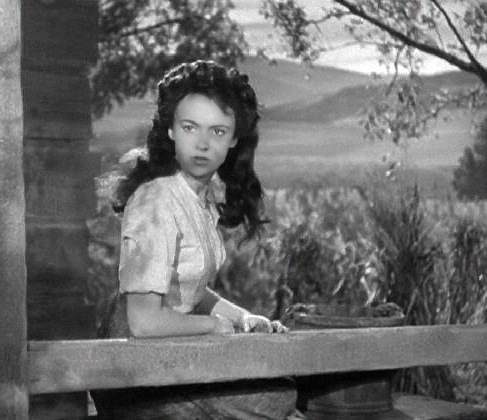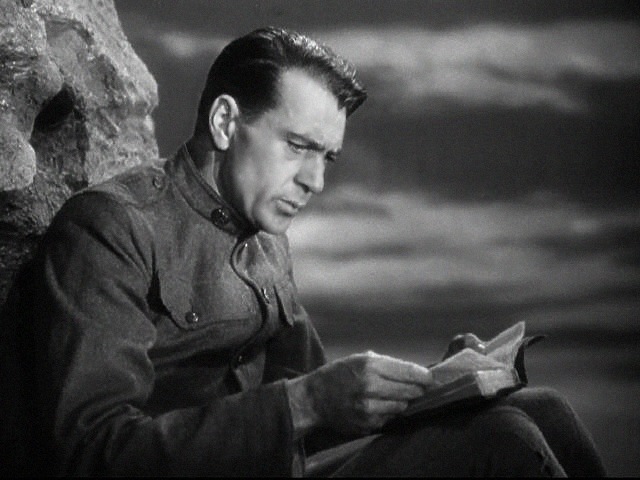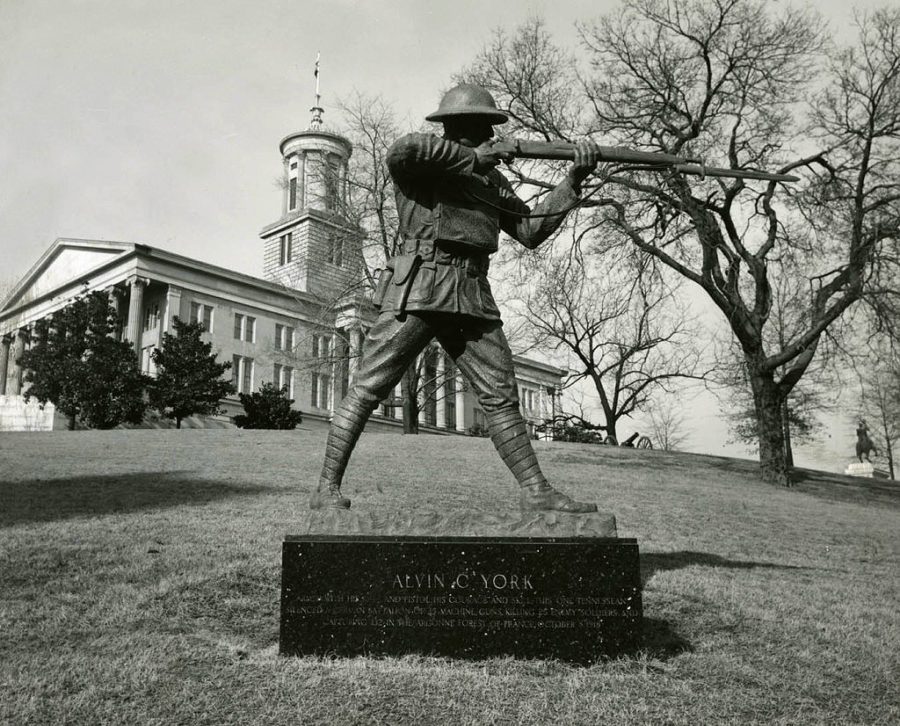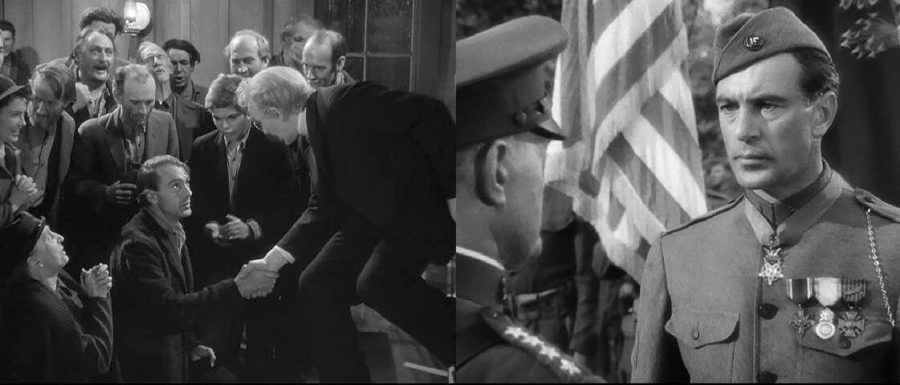Gary Cooper, Walter Brennan, Joan Leslie, June Lockhart, Ward Bond
Directed by Howard Hawks; Warner Brothers (1941) 134 minutes
Sergeant York, a film directed by Howard Hawks, stands out as one of the greatest of all time. It immensely satisfies both the patriot and the religious of heart. It is based on the true story of Alvin York, a pacifist yet a hero of World War I. Almost singlehandedly, he captured 132 Germans, and hence earned the Congressional Medal of Honor, Distinguished Service Cross and several other medals. Still, the film sparked controversy.
Congress had the movie withdrawn from the public one month after its release on the pretense that it was inciting Americans to intervene in World War II. Some legislators even argued that movies were excluded from the First Amendment! After the attack on Pearl Harbor, however, it was allowed to be shown again in December. If it was propaganda, it had tasteful subtlety.
York sold the rights to his story under the condition that Gary Cooper had the leading role. It is a wonderful privilege to choose a superstar to play oneself! Cooper (1901-61) deservedly won the Oscar for Best Actor for Sergeant York, the most lucrative film of 1941. Critics often undervalued his talents because he acted so naturally. He portrayed simple men easily. Because of a misdiagnosed broken hip as a youth, he had a distinctive gait throughout life. Born of English Anglicans in Montana, Cooper combined dashing elegance with western grit. Irving Berlin even wrote a lyric about how well dressed he was (the “million-dollar trooper” in Puttin’ On the Ritz).
 Religion was important to York, so the movie begins in church, and throughout, we hear verses of Scripture or hymns, and the role of the pastor is significant. Walter Brennan (1894–1974), who plays Pastor Rosier Pile, receives the young convert into the Church. For the record, Brennan is the only person to win three Oscars for Best Supporting Actor, but he was only nominated for this one.
Religion was important to York, so the movie begins in church, and throughout, we hear verses of Scripture or hymns, and the role of the pastor is significant. Walter Brennan (1894–1974), who plays Pastor Rosier Pile, receives the young convert into the Church. For the record, Brennan is the only person to win three Oscars for Best Supporting Actor, but he was only nominated for this one.
It is appropriate that “Coop” should have played a wayward man who experiences a conversion because, after a errant life, the handsome actor entered the Catholic Church two years before his death, thanks to the efforts of his wife, Veronica (Rocky), and a priest whom he nicknamed Father Tough Stuff. Dolores Hart, an actress who became a nun, was his godmother. A private audience with Pope Pius XII had prepared him for his future faith.
 Sergeant York was the first film to cost over two million dollars to produce, yet it was worth it. John Huston had a hand in the screenplay, skillfully interweaving serious threads with comic relief. Cooper was 40 years old, yet both Joan Leslie and June Lockhart were merely 16. Lockhart, who played Alvin’s younger sister, Rosie, later dominated television for ten years. Besides appearances in many series, she was Ruth Martin in 207 episodes of Lassie from 1958-64, and also Maureen Robinson in 82 episodes of Lost in Space from 1965-68. She is now 95 years old. Dickie Moore (1925-2015), who was George York, the young brother, was in several religious films: No Greater Love in 1932, Gabriel over the White House in 1933, Angels with Dirty Faces in 1938, Heaven Can Wait and The Song of Bernadette, both in 1943.
Sergeant York was the first film to cost over two million dollars to produce, yet it was worth it. John Huston had a hand in the screenplay, skillfully interweaving serious threads with comic relief. Cooper was 40 years old, yet both Joan Leslie and June Lockhart were merely 16. Lockhart, who played Alvin’s younger sister, Rosie, later dominated television for ten years. Besides appearances in many series, she was Ruth Martin in 207 episodes of Lassie from 1958-64, and also Maureen Robinson in 82 episodes of Lost in Space from 1965-68. She is now 95 years old. Dickie Moore (1925-2015), who was George York, the young brother, was in several religious films: No Greater Love in 1932, Gabriel over the White House in 1933, Angels with Dirty Faces in 1938, Heaven Can Wait and The Song of Bernadette, both in 1943.
In Sergeant York, we see typical elements of Appalachian culture, such as pressing sorghum stalks to extract its sweet juice. Bottom land is the fertile flood plain in the bend of a meandering river or creek. My Dominican forefathers in Kentucky sold their bottom land to local farmers when we no longer maintained a farm ourselves. York went to Fort Gordon which is an army base near Augusta, Georgia.
 Although he was never struck by lightning, his conversion was a divine intervention that hit him like that as Pastor Pile had predicted. For dramatic purposes, the bolt twisted his gun. Was that God’s way to stop him from shooting or to redirect his fire? York then struggled with pacifism. What kind of law goes against the “Good Book”? His biblical fundamentalism, however, softens after a vigil. Like Saint Augustine, York was drawn by providential revelation to a verse, “Render unto Caesar what is Caesar’s…” Hence, he determined to take a few lives to save many.
Although he was never struck by lightning, his conversion was a divine intervention that hit him like that as Pastor Pile had predicted. For dramatic purposes, the bolt twisted his gun. Was that God’s way to stop him from shooting or to redirect his fire? York then struggled with pacifism. What kind of law goes against the “Good Book”? His biblical fundamentalism, however, softens after a vigil. Like Saint Augustine, York was drawn by providential revelation to a verse, “Render unto Caesar what is Caesar’s…” Hence, he determined to take a few lives to save many.
This film begs the question: Is pacifism Christian? Jesus said, “I tell you, do not resist an evil person. If anyone slaps you on the right cheek, turn to them the other cheek also.” (Mt.5:39) Yet, Scripture also says, “The Lord is a warrior…” (Ex.15:3) Besides, “He trains my hands for battle…” (2Sm.22:35; Ps.18:34) Fighting to overcome evil is good. Consequently, the Doctors of the Church expounded the just war theory. Accordingly, there are criteria to determine both the right to go to war and right conduct in war. Indeed, without that justification, Mohammedans or Huns would have driven the Church underground.
Coincidentally, Cooper had been in other movies about World War I as far back as the days of silent movies. In 1932, he was in A Farewell to Arms based on a book by his friend, Ernest Hemingway, about a lieutenant in the ambulance corps who deserts to find his wife.
Since 2016, we can now compare Sergeant York to Hacksaw Ridge by Mel Gibson about another real pacifist who earned the Medal of Honor, but in World War II. Both stories start in similar settings, York in Tennessee and Desmond Doss in Virginia. Both movies develop the romantic relationship with the innocent girl back home. Whereas York eventually moderated his pacifism, Doss remained a strict conscientious objector, serving as a medic. The 1941 film was geared toward general audiences, but true to form, Gibson exposed war in high-definition gruesomeness for restricted audiences. Yet, both works can touch hearts profoundly with glorious heroism.
Sergeant York especially depicts the reward of the diligent laborer and the exaltation of the humble. The film has inspired me since my youth, so I once visited the hero’s statue by the capitol in Nashville. Today, one can also visit the Sgt. Alvin C. York State Historic Park in the Valley of the Three Forks to see his home, grist mill, grave and other places of his life. It was the little paradise for which he had spent himself, finally given to him by the people in gratitude.















